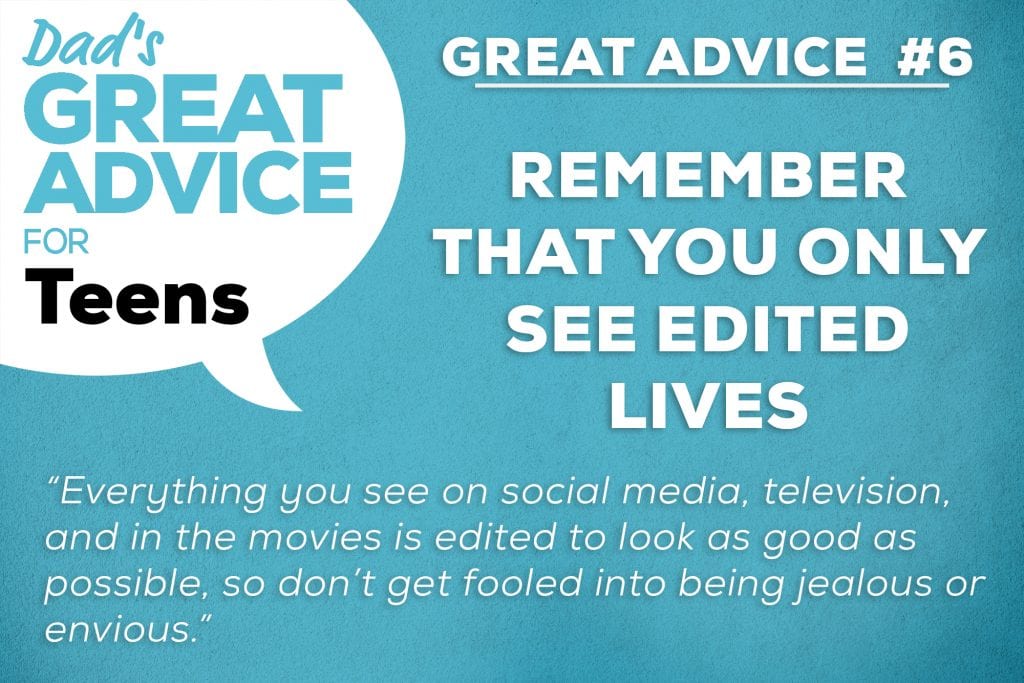These days, our kids have unprecedented access and insight into other people’s lives. Fictional movies, TV shows, YouTube videos, TikToks and reality TV give kids an inside look at the lives of real people from all over the world, and lets them see exactly what it’s like to keep up with the Kardashians (Spoiler alert: it’s absolutely awful).
Most impactfully, social media provides insight into the day-to-day lives of their friends and acquaintances, and makes it easy for kids to start comparing their own life to everybody else’s. But it’s important to remind them that every photo they see on Instagram, every moment they watch on television, every video they catch on TikTok and every post they read on Twitter has been edited in some way to get rid of all the unappealing, boring stuff, leaving only the crème de la crème.
I tell my children the story of the time when one of my good friends was tagged in a photo on Facebook having a blast with a dozen others at a huge, crazy party that looked like a lot of fun. Just seconds after it was posted, he called me from his car. “It was the most boring party I’ve ever had the displeasure of being stranded at,” he said. “I was just about to leave when the host asked me and the others to get together for a photo, so I put my arms around the total strangers next to me, smiled big while he snapped a shot, and then I took off.”
I remind my kids that what they see on social media is the 1/125 of a second that everybody looked like they were great friends, having an incredible time together at a crazy party. You don’t see the minutes, hours and days of those people’s lives where things were humdrum and calm. And more importantly, you don’t get to see the thoughts floating around the heads of all those people: the boredom, the insecurity, the loneliness and the fear that we all have.
What the world sees in social media feeds, in movies and in TV shows is the one percent of life that is most exciting. Social media is the “Greatest Hits” album of a person’s life. So, it’s important to remind our kids not to compare their own unedited lives to someone’s edited “highlight reel,” because it isn’t a fair comparison, and only serves to inspire jealousy and envy (two of the ugliest, most destructive emotions).
Not only do we have to teach our kids how best to consume social media, but also how best to contribute to social media, especially when it comes to the photos they post online. It hopefully won’t come as a shock to learn that there are a lot of photos being posted online that are somewhat risqué or sexual in nature, sometimes by teens. And when it comes right down to it, there’s absolutely nothing wrong with celebrating the human body. (Even if you’ve got a body shaped like mine.)
But it pays to remind our kids that what gets published on the internet stays on the internet. Forever. More importantly, kids need to understand that every image they take of themselves and post for the world to see for the rest of time says something about them. A picture speaks a thousand words, and with a risqué selfie, some of those words are “My looks are the most important thing about me, not my personality, my athleticism, my intelligence, my humor, my business acumen or anything else.” As parents, it’s our job to make our kids think about whether that’s really the type of attention and admiration they want not just today, but 10 or 20 years from now.
It’s not easy to get a teen to think past next week, let alone years down the line, but one strategy is to help them find a middle ground. Ask them to consider taking photos that, while still showcasing their physical beauty, focus on things other than their beauty and sexuality. For instance, if they’re at the beach, instead of taking photos of themselves in a fashionable swimsuit lying in a sexy pose on the sand, illustrating how beautiful they are, urge them to take a photo of themselves in a fashionable swimsuit surfing the waves, illustrating how athletic they are. Or, take a photo of themselves in a fashionable swimsuit reading at the beach, showing how intellectual they are.
Kids need to be convinced that every post to their online persona is helping to permanently define their own personal brand image. Every selfie they post, every word they write, every opinion they publish and every comment they make reveals to the entire world something about them, their values, their personality and their opinions, and it remains public for the rest of time.
Remind your teen that if a photo they’re about to post doesn’t portray them in the way they want to be portrayed, not just today but for the rest of their life, they need to think twice before posting it.Marc Fienberg is the author of Dad’s Great Advice for Teens and a life coach. For more information, visit


























